Kids in the Kitchen - Tips and Activities to Make Cooking Fun

Benefits of letting kids participate in the cooking process
If you have a preschooler, chances are that every time you head to the kitchen, they practically beg you to let them help out. They are at an age where they are just itching to be part of everything the rest of the family does, including whatever you have going on in the kitchen.
So, should you let them join you? According to experts, you should.

Cooking has been shown to be tremendously beneficial to young children. Several studies have shown that kids who learn to cook from an early age have an advantage when it comes to language skills and basic math skills. Plus, letting them participate in the process of creating a meal boosts their self-confidence and helps promote healthy eating habits.
Therefore, the next time they want to help out in the kitchen, let them. While it might mean doing things differently by being more flexible and doing lots of prep work, if you have the right expectations, you can make your cooking sessions fun, enjoyable, and memorable.

Benefits of cooking for preschoolers
Here are a few more benefits of cooking for children of ages 3 to 5 according to experts:
- It helps in the development of essential basic skills. Doing something as simple as counting eggs and pouring water into a measuring cup can help your child hone their math skills in a huge way. Reading a recipe can improve their literacy skills, and following steps chronologically makes them more attentive while also improving their listening skills.
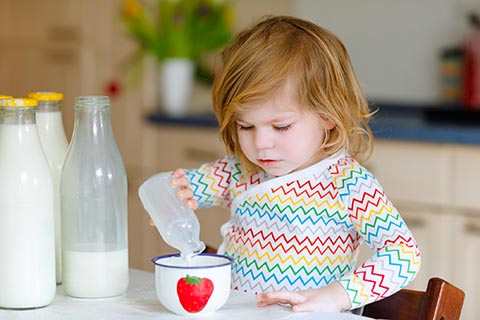
- It exercises their senses. A lot of things happen in the kitchen. It is the perfect place for kids to explore the world around them with all their senses. Encourage them to listen to the ding of the microwave, the tick of the timer, or the whir of the mixer. Let them pound and knead the door then watch it rise. Ask them to describe the smell of whatever is baking in the oven. And finally, when everything is ready, let them have the first taste.

- It helps expand their palate. Young kids can be painfully picky eaters. However, when you cook meals with them, it makes them more adventurous when it comes to food. It is easier for them to eat what they helped make than it is to eat something completely foreign that you serve them.

- It helps boost their confidence. Kids are show-offs. They love the attention they get when you notice what they can do. Be sure to point out how big a role they played in cooking dinner. Praise their efforts even when the final result is not up to your standards. The feeling of accomplishment they’ll get will give their confidence a massive boost.

Montessori kitchen activities to help make cooking with your child fun
- As you cook, ask them what ingredient comes first, second or third. Alternatively, count out loud together as you spoon cookie dough onto the cookie sheet. Besides being fun, this will also boost their math skills.
- Read the recipe together. Let them do most of the reading and only help out when you feel you have to. This will help build their vocabulary, promoting literacy.

- As you cook together, encourage them to taste different ingredients and talk about what they like or don’t like about them. This will give you a great opportunity to introduce the subject of healthy eating and how food is important for growth.

- Let them help out with simple tasks in the preparation process. Here are a few ideas:
- Let them pound the dough
- Ask them to tear the lettuce for salads
- Let them assemble the pizza
- Allow them to stir the pancake batter
- Ask them to pour water into measuring cups
- Ask them to sort large ingredients into different bowls
- Let them add the ingredients into the dish
- Let them stir the stew for a few minutes
- Make them your page turner as you read the cookbook
The key to making cooking with your little one fun is assigning them age-appropriate tasks that they can do well. Make sure the jobs you give them are fun, too.
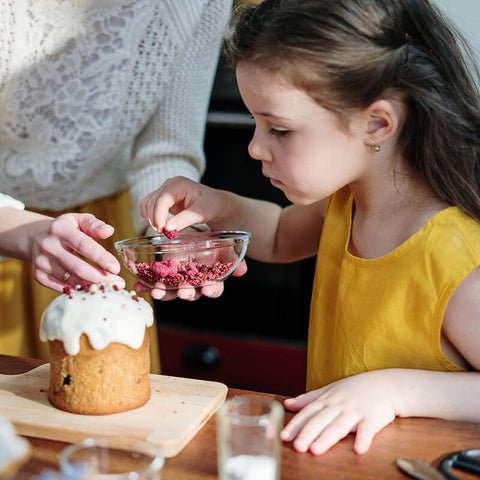
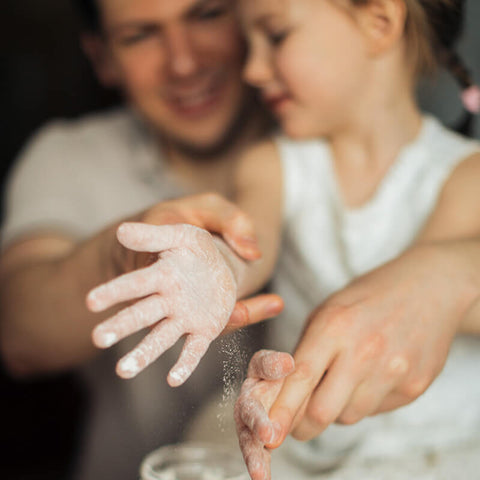
Pro-tips for parents: how to get them engaged in the cooking process
- Take them with you as you go grocery shopping. Let them pick out one or two items that they’d like to try for dinner. Doing this will make them more likely to want to eat the food that they helped shop for. If there is a local farmers market near you, take your kids there and let them ask the farmers whatever questions they want to.

- You can look though cookbooks and online recipes together. If they see a recipe they like, plan to try making it together.
- If you are just starting out, you want to find a few activities that they can do completely on their own with minimal supervision and involvement from you. Things like cutting shapes into rolled dough using a cookie cutter or sprinkling cheese on a finished pizza are great ways to introduce your little one to the art of cooking.

- Keep things simple. Kids have rather short attention spans. When any activity drags on for too long, they get bored and lose interest. Therefore, you want to plan simple 5-10-minute projects that are fun and engaging.
- Cooking with your child is all assigning them the right age-appropriate tasks. Start out simple, then as they grow, give them more things to do. You can progress to beating eggs, then squeezing lemons, then mashing potatoes, then grating cheese and finally cooking a simple dish on their own.

- Make sure you are in the kitchen at all times as your child learns to cook. Keep your eyes peeled and constantly supervise them to prevent any kitchen accidents from happening.
- As a weekend art project, buy and decorate a few plain aprons together. Let everyone do their own apron. Then during the week, let them put them on and cook while wearing them. It is a great way to start building up the excitement and make them take ownership of the meals they make.

- Teach by example. Before letting your child attempt to do anything, demonstrate it and let them learn by watching you first. Also, practice good kitchen hygiene and uphold the highest safety standards as you cook. This way, they will grow up learning that that is how things are done and adopt the same good habits. Here is a list of basic food safety practices to follow:
- Wash your hands in warm soapy water before handling food
- Keep all working surfaces and counter tops clean
- If you have long hair, pull it back over your shoulders
- Wait until the food is cooked before tasting. Don’t let your kiddo lick their fingers or put them in their mouths while cooking
- Don’t double-dip your spoons after using them for tasting
- Keep raw foods separate from cooked and ready-to-eat foods
- For younger kids give them a boost up to the counter with a toddler kitchen tower

Child-friendly kitchen utensils
As you cook with your child, it is very important that they only use the right kitchen utensils for them. When you invest in safe, easy-to-use utensils, your little one will be able to get great results, and everyone will have a ton of fun every time you cook together!
- Knives: Get them 3-inch paring knives or 5-inch chef’s knives. Make sure the knives have easy-to-grip handles. At this size, the knives are big enough to be used comfortably and also small enough for them to handle safely. Always make sure that the blade is sharp so they’ll need less pressure to get desired results, which reduces the chances of an accident happening. Finally, whenever your child is handling a knife, closely supervise them.

- Bowls: Stainless steel bowls are great if you are afraid they might drop something. Otherwise, go for transparent glass bowls to help them see everything that’s happening as they mix things together. Make sure all your bowls have extra grippy bases.

- Spoons and whisks: Go for smaller spoons and whisks with easy-to-grip handles. Also, invest in bendy, resilient silicone spatulas
- Scales: Manual scales will teach your little one how measurements work. Electric scales are also good if you need something fast and easy
- Pots and pans: They should only use pots and pans with insulated handles that won’t get hot. Use the smallest size that your recipe quantities will allow.

As you get these utensils, be sure to also get a Montessori Kitchen Stool to help them stand right at the counter as they help you. It’s a lot more secure than standing on a step stool or a chair.
Also, if your little one is excited about cooking and you have no time to hand-pick all their utensils one by one, there are kitchen gift sets that you can get. These will contain several tools, making your job a lot easier.
Dish washing with kids

While cooking an important skill to learn, cleaning up after themselves is also an important life skill that they should also master if they are going to become contributing members of the family.
Dish washing with kids will vary depending on how many kids you have and how old they are. You can set up a roster so each child can get a night to do it by themselves, or have the kids work together to get the work done faster.

Be sure to teach your kids how to load up the dishwasher correctly. Show them how to line up items efficiently. What goes to the top and what goes to the bottom? Where should knives and spoons face?

In the Montessori method, dish washing is a pretty important part of practical life. If your child can master it, it shows that they are able to follow long work sequences. It helps them develop an internal sense of order as well as a high degree of self control.
Through dishwashing, they’ll also be able to improve their coordination and concentration.
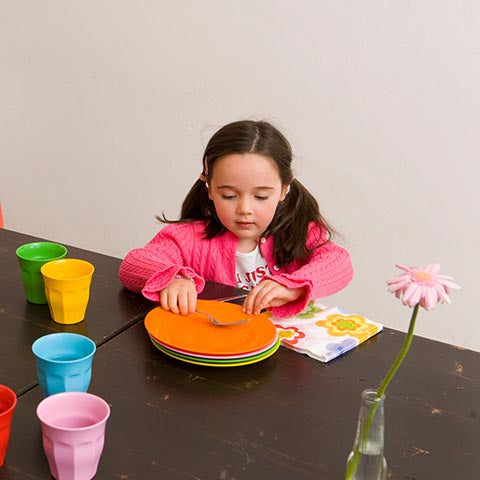
It is important that your child understands that dish washing is not just about loading dishes in the dishwasher. Here is a list of other activities that fall in this category:
- Clearing the table
- Scraping the dishes
- Loading the dishwasher
- Handwashing items that need to be handwashed
- Drying handwashed utensils
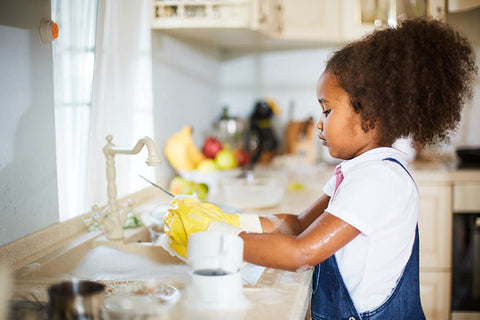
It will also give you the opportunity to teach your child how kitchen waste needs to be properly disposed. If you compost, show them what gets thrown away and what goes into the compost bin. If you have a garbage disposal, show them how it works, what is safe to put in, and what shouldn’t be put in.
If you have several kids, you can make things a little more fun by putting one of them in charge of the “washing dishes music” every night. Just make sure that any dancing that happens is done safely!
Montessori kitchen snack-area for toddlers

Montessori kitchen snack areas for toddlers are also important for your growing toddler. You want them to develop independence and autonomy in all things, including pouring their own cereal, grabbing a fruit or cookie when they feel like it, put apple cores in the compost when they are done, and clean up their own messes without needing help or asking for permission. In this way, Montessori snack areas empower your little one and make them realize that they are capable of doing quite a lot of things on their own.

To set up a Montessori snack area for your toddler in your home, you can either choose to buy new dedicated shelves and storage sections for it, or use space that you already have. You can use the bottom shelves in your pantry (as long as they are within reach) or repurpose an old bookcase. The options are endless, really, you just have to find something that is accessible and usable for your child.

The snack area will look different every day. You’ll have to clean up a little after them especially in the beginning as they learn, but with time, they will become more independent and start doing everything on their own. Mix things up every day with the food and the food preparation equipment.

Depending on your child and the amount of space you have in your home, you may also want to extend your toddler’s snack area to include an eating area and a food preparation area. Things like drinks and refrigerated snacks should also be within reach. Finally, they should also be able to reach the dishwasher or the sink to put in the dirty dishes once they are done.
Final Thoughts

The best way to start getting your child excited about eating right is to allow them into the kitchen and let them help out in creating the meals in the first place. When kids participate in the cooking process, it plants a seed that grows into a passion for cooking and good food that will last a lifetime!
The best way to start getting your child excited about eating right is to allow them into the kitchen and let them help out in creating the meals in the first place. When kids participate in the cooking process, it plants a seed that grows into a passion for cooking and good food that will last a lifetime!
Read more about Montessori furniture.


